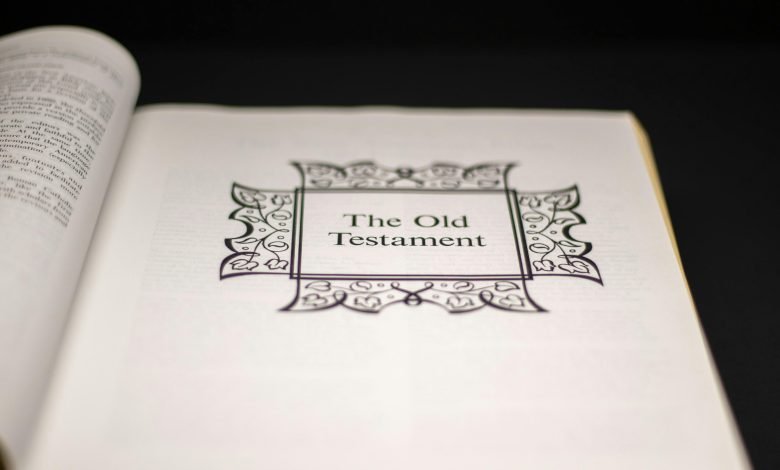
Why Do We Need the Old Testament and How Important Is It?
Without the Old Testament, neither you nor I would know half of what God did to save Israel from themselves. The New Testament tells us the reason for our hope, but the Old Testament tells us what God did to give us that hope.
Growing up, I always heard Christians reciting this to non-believers: “Believe and be saved.” I don’t disagree with the sentiment, but it’s easy to focus so much on this drop that we ignore the ocean it is in: the Bible. Ignoring the Old Testament is especially easy because Lamentations is sad, Daniel’s visions are confusing, and Song of Solomon is quite uncomfortable.
This is what you and I forget 99 percent of the time: God chose what would be in the Bible. Therefore, the fact that the Old Testament exists means that God deliberately placed it there.
My small human brain can in no way wrap itself around the thoughts of God. However, it can present four things that the Old Testament does for those who read it. Let’s go over these four points.
Read more: The Story of Rachel in the Bible and Its Significance
-
فرست محتوا
Preserving and Transmitting the History of His People’s Salvation
Anyone who reads the Old Testament quickly can see that, despite being God’s chosen people, the Israelites made many mistakes. A lot.
For instance, despite seeing God strike Egypt with plagues (Exodus 7:14, Exodus 11:10), part the Red Sea (Exodus 14:1-22), and then close the sea over their pursuers (Exodus 14:23-31), the Israelites grew anxious at Mount Sinai and said to themselves, “This God isn’t real. Let’s worship a shiny cow instead” (Exodus 32:1-5).
This was neither Israel’s first nor last mistake, and God ensured that the biblical writers did not omit any of them. But what does God do after the Israelites make mistakes again? He saves them. He saves them every time.
Without the Old Testament, you and I wouldn’t know half of what God did to save the Israelites—our spiritual ancestors—from themselves.
We also wouldn’t understand the theological or cultural roots from which the New Testament, particularly the Gospels, sprang. And if we didn’t know the Gospels, where would we be?
-
Showing That God Is Deeply Invested in Our Daily Lives
Before the Israelites reached the Promised Land, they had no president, prime minister, or even king. Israel had what we modern people call a theocracy. In a theocracy, the religion is the state and the state is the religion.
This means that the laws laid out in Exodus, Leviticus, and Deuteronomy were not just “you should” and “you shouldn’t” for private life; they were public law, just as paying taxes and stopping at stop signs are laws.
“Who cares?” you ask, “Leviticus is still boring.”
That might be true, but the fact that God’s law was also the land’s law shows us something important: God didn’t just want to see the Israelites on weekends and Passover. He wanted to be an integral part of their lives so they could thrive.
This remains true about God today: He wants to be with us when we eat our sweets, pay our electricity bills, and fold the laundry that’s been sitting in the dryer all week. Without the Old Testament, we wouldn’t know that no detail is too small for our God to care about.
-
Teaching Us How to Praise God
When most Christians think of praise, they think of singing along to Hillsong covers in church. This is largely because the book of Psalms is a collection of hymns and poetry, and partly because singing happy songs on Sunday makes our hearts feel warm and fuzzy.
Since much of modern Christian worship comes from happy material, believers forget that not all praise comes from a place of joy. Job’s love for God cost him everything, some Psalms (like 28, 38, and 88) are desperate cries for help, and Ecclesiastes is a sermon on the futility of life.
Job, Psalms, and Ecclesiastes differ in nature, but they share the same goal: acknowledging God as the Savior not despite hardship and suffering, but because of it.
Without these less cheerful Old Testament writings, we wouldn’t know that pain can and should be harnessed for praise. We would only be able to praise God when we were happy.
-
Prophesying the Coming of Christ
God saves Israel, makes Himself part of our lives, teaches us how to praise Him… what’s the point of all this? Why do we need a seemingly meaningless collection of facts, laws, and troubled poems when “believe and be saved” has been tested and proven?
Because the Old Testament has something else to offer: prophecies about Jesus. Isaiah 7:14 tells us that Jesus will be called Immanuel or God with us. The prophet Hosea marries a prostitute to symbolize Jesus’s love for His undeserving church. And Daniel 7:13-14 foretells Jesus’s second coming.
These and dozens of other prophecies gave Old Testament Israelites something to hope for: the end of the covenant of law and the beginning of the covenant of grace. Modern Christians also gain from this: understanding that God took thousands of years—yes, thousands—to take care of His family.
What Is the Importance of the Old Testament?
If you forget everything else about this article, remember this: the New Testament tells us the reason for our hope, but the Old Testament tells us what God did to give us that hope.
The more we read it, the more we understand and appreciate what He has done for sinful, stubborn, and foolish humans like us who don’t deserve it.







